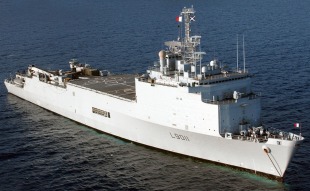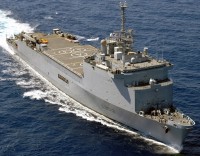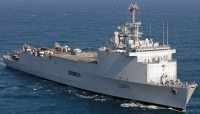Десантные транспорты-доки типа Foudre
Основная информация
Главные размерения
Машина
- Installed power 15,480 kW (20,760 bhp)
- 2 * SEMT-Pielstick 16 PC 2.5 V400 diesel engines
- 2 * controllable-pitch propellers
- 1 * bow thruster (750 kW; 1,000 hp)
- 5 * 850 kW diesel alternators
Персонал
Боевые силы и средства
- 10 * CTMs
- 1 * DRBV-21A air/surface search radar
- 1 * Decca 2459 surface search radar
- 1 * ARBB-36 jammer
- 1 * SLQ-25 Nixie decoy system
- 3 * Simbad launcher systems for Mistral SAMs
- 3 * single 30 mm (1.2 in) Breda-Mauser guns
- 4 * single 12.7 mm (0.50 in) machine guns
- 4 * Super Puma EC225 or 2 * Aérospatiale SA 321 Super Frelon
The Foudre-class landing platform dock is a class of landing platform docks designed and constructed for the French Navy. Designated Transport de Chalands de Débarquement, they were intended to replace the ageing Ouragan class and the construction of four vessels was planned. Only two were built and the remaining two were instead reordered as Mistral-class amphibious assault ships. The two ships of the Foudre class, Foudre and Siroco, operated with the French Navy between 1990 and 2014. Replaced by the Mistrals, in 2011 Foudre was sold to the Chilean Navy and Siroco was sold to the Brazilian Navy in 2015.
The Foudre class was designed to embark a mechanized regiment of the Rapid Action Force and act as its logistical support vessel once in theatre. Designated Transport de Chalands de Débarquement by the French Navy, they were ordered as replacements for the Ouragan class with improvements over the previous design. The improvements included a higher speed, a hangar for helicopters, an elevator allowing for the quicker transfer of cargo between decks of the ship and side ramp embarkation, allowing for the loading of troops and vehicles from dockside. Due to delays in the procurement of the ships, the two vessels were built to slightly different layouts, with the second ship of the class, Siroco incorporating a number of improvements later added to the first, Foudre. Foudre displaces 8,190 tonnes light, 9,300 t standard, 11,880 t at full load and 17,200 t when flooded. Siroco has a displacement of 8,230 t light, 12,013 t at full load and 17,205 t when flooded. The vessels are 168 metres long overall, 160 m between perpendiculars with a beam of 23.5 m and 22 m (72 ft 2 in) at the waterline with a draught of 5.2 metres and 9.1 m when flooded.
The vessels are both propelled by two controllable pitch propellers powered by two SEMT-Pielstick 16 PC 2.5 V400 diesel engines creating 15,480 kW (20,760 bhp). The vessels also have a 700 kW (940 shp) bow thruster used primarily during amphibious operations. The Foudre-class ships have a maximum speed of 21 knots (39 km/h; 24 mph) and a range of 11,000 nautical miles (20,000 km; 13,000 mi) at 15 knots (28 km/h; 17 mph). They are equipped with five 450 kW diesel generator sets creating a total of 4,250 kW of electricity. The ships have an endurance of 30 days at sea. The citadel is nuclear, biological and chemical protected.
The Foudre class carry large stowage areas which can be used to ferry battle tanks and vehicles. Each ship has a 122 by 13.5 m docking well capable of stowing ten chaland de transport de matériel (CTMs) or one chaland de débarquement d'infanterie et de chars (CDIC)/engin de débarquement d'infanterie et de chars (EDIC) with four CTMs or two CDICs. They can also store two landing craft vehicle personnel suspended from davits abeam the aft part of the docking well. The landing craft can be put to sea by filling ballast tanks lowering the ship, and opening the rear door, flooding the well deck with 3 m of water. The ships can ballast down in 30 minutes with 7,000 m2 of ballast capacity. It takes a further 45 minutes to de-ballast. To aid in the quicker loading of the ship dockside, the vessels were given side-door loading capability. The well deck is capable of docking a ship up to 400 t.
The ships have permanent accommodation for 470 troops but can support up to 2,000 for three days. They have capacity for 1,080 t of vehicles and cargo stowed in a 1,360 m2 area. This can be extended by using the forward third of the well deck that is kept dry using a cofferdam. The well and cargo decks are serviced by a 13.5 by 8 m elevator with a lift capacity of 56 t and a crane with a 37 t lift capacity in Foudre and 38 t capable crane in Siroco. The ships can also store up to 150 t of cargo fuel. They also sport a 600 m2 hospital area located beneath flight deck in order to ease transfer of casualties. The hospital facilities include two surgical operating suites and 47 beds. The ships also have repair and maintenance facilities.
The Foudre-class ships are equipped with a hangar capable of accommodating four Eurocopter Super Puma or two Aérospatiale Super Frelon helicopters. They each have a flight deck amidships capable of operating two Super Puma helicopters simultaneously. Foudre's flight deck, measuring 1,450 m2 has two landing spots but only one fitted with SAMAHE haul-down systems. Siroco's flight deck measures 1,740 m2 after it was extended aft. Both ships can add an additional 30 by 15 m landing spot on portable helicopter and vehicle stowage platform aft. Five 6 m, 25 t floatable sections can be added or lifted off by the 37/38-ton cranes. The vessels carry 184,000 L (49,000 US gal) of JP-5 aviation fuel.
Foudre was initially armed with two two-round Sadral launchers for Mistral surface-to-air missiles, one located to either side of the bridge and one 40-millimetre (1.6 in) gun and two single-mounted 20 mm guns. The Mistral missile has an infrared homing to 2.2 nmi with a 3-kilogram warhead. The Sadral launchers were replaced with Simbad launchers and the number was later increased to three in Foudre with the third mount fitted atop the bridge. In 1998, the 40 mm and 20 mm guns were removed and replaced with 30 mm Breda-Mauser guns. The 30 mm guns can fire a 0.36 kg shell 1.6 nmi and up to 800 rounds/minute. Siroco was equipped with the 30 mm guns during construction and received a third Simbad launcher in 2002. Both ships are equipped with four 12.7 mm machine guns.
Both ships received SENIT 8.01 with Link 11 reception and OPSMER command support systems. Two SAGEM VIGY-105 optronic fire control systems were installed for the 30 mm guns. They are equipped with Thomson-CSF DRBV 21A Mars air and surface search radar operating on the D band and a Racal Decca 2459 surface search radar operating on I band. For electronic warfare, the vessels mount Thales ARBB-36 jammer and SLQ-25 Nixie towed torpedo decoy systems. One of the DRBN 34A navigation radars is situated aft to aid in helicopter flight operations.
Корабли2
- Комментарии
 ru
ru en
en uk
uk




 Военно-морские силы Чили (Armada de Chile)
Военно-морские силы Чили (Armada de Chile) Военно-морские силы Франции (Marine Nationale)
Военно-морские силы Франции (Marine Nationale) Военно-морские силы Бразилии
Военно-морские силы Бразилии Naval Group (formerly DCNS)
Naval Group (formerly DCNS)
